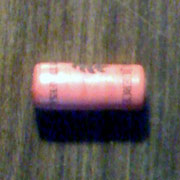When cork alternatives go bad
 Just about every wine enthusiast from beginner to advanced "wine geek" knows about the cork wars by now. The past decade has seen a remarkable rebellion against the long-established natural cork in favor of alternative closures that range from high-tech treated corks to plastic plugs to sturdy metal screw caps to such offbeat options as plastic "Zork" stoppers that unwind, or apothecary-style glass stoppers that take us back to the 16th century.
Just about every wine enthusiast from beginner to advanced "wine geek" knows about the cork wars by now. The past decade has seen a remarkable rebellion against the long-established natural cork in favor of alternative closures that range from high-tech treated corks to plastic plugs to sturdy metal screw caps to such offbeat options as plastic "Zork" stoppers that unwind, or apothecary-style glass stoppers that take us back to the 16th century.All of this activity can be traced back to a simple reality: While natural cork has been in general use as a wine stopper for more than 200 years, and a sound cork boasts certain natural advantages for wine cellaring, a small but non-trivial percentage of natural corks can ruin wine by tainting it with a chemical reaction between the wine and a natural fungus that occurs in cork.
Most of the alternative-closure activity has focused on two formats: The screw cap, particularly a heavy-duty brand called Stelvin; and synthetic stoppers that resemble corks in shape and size but are made of plastic.
Screw caps, initially abhorred because they evoked the cheap, rotgut wines that had long been packaged with a lightweight, simple version, have been gaining ground strongly in recent years. Particularly Down Under, it is becoming hard to find a white wine with any other closure, and the Stelvin is making strong inroads among reds.
Even in the more wine-conservative U.S. and Europe, screwcaps are becoming more and more common - and wine-savvy consumers are learning to embrace them, especially as lingering concerns about long-term aging begin to fade and producers master minor alterations in the bottling process.
But the story on synthetics, sadly, doesn't have such a happy ending. Quickly embraced by many in the industry because they're shaped like corks and can be made to look a bit like corks (albeit sometimes in wild and wacky colors), and can usually be inserted by existing bottling lines and removed - sometimes with difficulty - with a standard corkscrew.
Unfortunately, while solving the problem of cork taint, synthetics soon showed problems all their own. Despite engineering efforts to fashion them with physical characteristics as close to natural cork as possible, growing experience suggests that they're not suitable for wines destined for anything more than short-term drinking.
In my experience, wines closed with either type of synthetic - solid plastic plug or two-component type with slick outer sleeve and foamy interior - are risky investments for keeping more than a year or two. It would take all my fingers and toes and more to count the synthetic-stoppered wines that I've found "tired" and marginally oxidized only three or four years after the vintage.
The latest offender, opened just the other night, was an Italian red from from Basilicata, the "instep" of the Italian "boot." I had tasted Tenuta le Querce 2000 "Il Viola" Aglianico del Vulture twice before, on April 18, 2004 and again on May 7, 2005 (at which point its retail price had jumped up three bucks to $18.99). Both times the wine showed lots of ripe dark fruit - plums, blackberries and blueberries - with licorice and oak and so much tannin that it clearly needed cellar time.
Fair enough.
I put away one more bottle, forgot it for a few years, until the other day, when I was rooting around in the same dusty corner that revealed the 1999 Julienas Cru Beaujolais featured in Monday's edition, I found the last bottle.
Out came the red plastic cork and ... meh. The tannins are still going strong, but the fruit is gone entirely, replaced by an odd aroma that smelled like mud puddles in red clay to me. My wife thought it smelled like plastic and spit it out, fearing that some petrochemical gunk had leached into the wine. Note well that I don't think this is likely. But the wine was dead on arrival, and I'm satisfied that the synthetic plug is to blame.
It's too bad when a new technology intended to solve a problem proves to have new problems of its own, but that, I suppose, is the price of progress. Bring on the screw cap, as far as I'm concerned!

